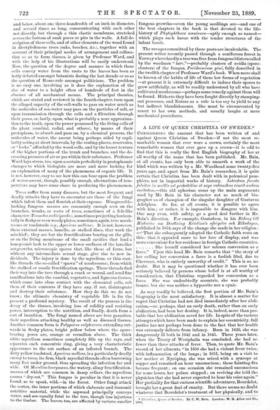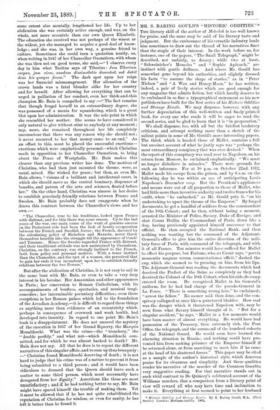A LIFE OF QUEEN CHRISTINA OF SWEDEN.* CONSIDERING the amount
that has been written of and against Queen Christina of Sweden—if not the most re- markable woman that ever wore a crown, certainly the most remarkable woman that ever gave up a crown—it is odd to find that this is really the first English biography of her at all worthy of the name that has been published. Mr. Bain, at all events, has only been able to unearth a work of the kind which was written by a Mr. Woodhead some twenty-five years ago, and, apart from Mr. Bain's researches, it is quite certain that Christina has been dealt with in polemical pam- phlets, not in impartial works of history. lnterdum fucata falsitas in nwltis est probability• et swpe rationibus vincit nuclant veritatem,—this old aphorism sums up the main arguments used by Mr. Bain in his character not so much of bio- grapher as of champion of the singular daughter of Gustavus Adolphus. So far, at all events, it is possible to agree with him ; or rather, it is impossible to disagree with him. One may even, with safety, go a good deal further in Mr. Bain's direction. For example, Gustafson, in his Bidray till Histories om Drottning Kristina's afsagelse och Biksdagen, published in 1654, says of the change she made in her religion : —" That she subsequently adopted the Catholic faith rests on this : that it appealed more to her love of display, and was more convenient for her residence in foreign Catholic countries.
She herself considered her solemn conversion as a farce." Upon this head Mr. Bain remarks that "the story of her calling her conversion a farce is a foolish libel, due to Cheri-eau, who is entirely unworthy of credit." This is so, no doubt. But it may be questioned whether it has ever been seriously believed by persons whose belief is at all worthy of consideration, that Christina regarded her conversion as farce. She was undoubtedly eccentric, she was probably insane, but she was neither a hypocrite nor a cynic.
As may readily be believed, the first portion of Mr. Bain's biography is the most satisfactory. It is almost a matter for regret that Christina had not died immediately after her abdi- cation,—or, perhaps, that an early death, rather than an early abdication, had been her destiny. It is, indeed, more than pro- bable that her abdication saved her life. In spite of the various attempts which have been made to explain her eccentricity, full justice has not perhaps been done to the fact that her health was extremely delicate from infancy. Born in 1626, she was. dangerously ill both in 1642 and in 1645. Three years later, when the Treaty of Westphalia was concluded, she had no fewer than three attacks of fever. Then, to quote Mr. Bain's record of her ailments, "in 1650 she had a violent fever twice, with inflammation of the lungs ; in 1651, being on a visit to her mother at Nycoping, she was seized with a syncope at supper and remained an hour unconscious ; these fainting-fits became frequent ; on one occasion she remained unconscious for some hours, her pulses stopped ; on reviving she told the physician that she had never expected to hear his voice again." Her partiality for that curious scientific adventurer, Bourdelot„ brought her a great deal of enmity. But there seems no doubt whatever that Bourdelot's treatment of her physically, and to.
• Christina, Queen of Swedes. By P. W. Bain. London.: W. H. Allen and Co.. 1890.
some extent also mentally, lengthened her life. Up to her abdication she was certainly active enough, and was, on the whole, not more eccentric than our own Queen Elizabeth. The education she received was not perhaps of the wisest or the widest, yet she managed to acquire a good deal of know- ledge ; and she was, in her own way, a genuine friend to culture. Sometimes she could turn a quotation neatly, as, when writing in 1647 of her Chancellor Oxenstiern, with whom she was then not on good terms, she said,—" I observe every day in him what Tacitus says of Tiberius : Jam Tiberiunt corpus, jam vires, nondum dissimulatio deserebat, sed dabit deus his quoque fluent." The dark spot upon her reign was her financial mismanagement. Her alienation of the crown lands was a fatal blunder alike for her country and for herself. After allowing for everything that can be urged in palliation of her conduct, even her thick-and-thin champion Mr. Bain is compelled to say :—" The fact remains that though frugal herself to an extraordinary degree, she was possessed of a mania for squandering, which is a great blot upon her administration. It was the sole point in which she resembled her mother. She seems to have considered it only natural to give without stint to anybody at any moment ; nay, more, she remained throughout her life completely unconscious that there was any reason why she should not ; it never occurred to her that money came to an end." As an offset to this, must be placed the successful exertions— exertions which were emphatically personal—which Christina made in opposition to her Chancellor Oxenstiern, to bring about the Peace of Westphalia. Mr. Bain makes this clearer than any previous writer has done. The motives of Christina, who had then just mounted the throne, were, as usual, mixed. She wished for peace; but then, as even Mr. Bain allows, " visions of a brilliant and intellectual court, in which she should move as the central luminary, dispenser of benefits, and patron of the arts and sciences, floated before her." On the other hand, Christina was sincere in her desire to establish genuinely friendly relations between France and Sweden. Mr. Bain probably does not exaggerate when he draws this contrast between the Chancellor's views and her own
"The Chancellor, true to his traditions, looked upon France with distrust, and for this there was some reason. Up to the last years of the war, one main cause of the want of genuine success on the Protestant side had been the lack of hearty co-operation between the French and Swedish forces ; the French, directed by the calculating policy of Richelieu and Mazarin, never threw themselves heartily into the struggle till the appearance of Conde and Turenne. Hence the Swedes regarded France with distrust, and their traditional attitude was now maintained by Oxenstiern. Christina, on the contrary, was strongly inclined to the French, both from policy and personal motives. With a truer instinct than the Chancellor, and the tact of a woman, she perceived that to gain her ends it was incumbent upon her to establish friendly relations between the two Powers."
But after the abdication of Christina, it is not easy to sail in the same boat with Mr. Bain, or even to take a very deep
interest in his heroine. Her Amazonian and other appearances in Paris ; her conversion to Roman Catholicism, with its accompaniments of bonfires, spectacles, and musical tragi- comedies; her interminable pecuniary difficulties ; even those receptions in her Roman palace which led to the foundation of the Arcadian Academy,—it is difficult to regard these things as anything more than evidences of an eccentricity which, perhaps in consequence of overwork and weak health, had developed into insanity. In regard to one point Mr. Bain's book is a disappointment. He does not unravel the mystery of the execution in 1657 of her Grand Equerry, the Marquis Monaldeschi. What was the crime—the " treachery," the " double perfidy," and what not—which Monaldeschi com- mitted, and for which he was almost hacked to death? Mr. Bain does not say. All that he does is to repeat the different
narratives of this singular affair, and to sum up tb us brusquely : —" Christina found Monaldeschi deserving of death ; it is not hard to judge that his crime was of a nature to prevent it from being submitted to a third person ; and it would have been ridiculous to demand that the Queen should leave such a matter to some third person, which must necessarily have derogated from her dignity." Assertions like these are most unsatisfactory; and if he had nothing better to say, Mr. Bain
might have spared himself the trouble of making them. Yet it must be allowed that if he has not quite rehabilitated the reputation of Christina for wisdom, or even for sanity, he has left it better than he found it.







































 Previous page
Previous page